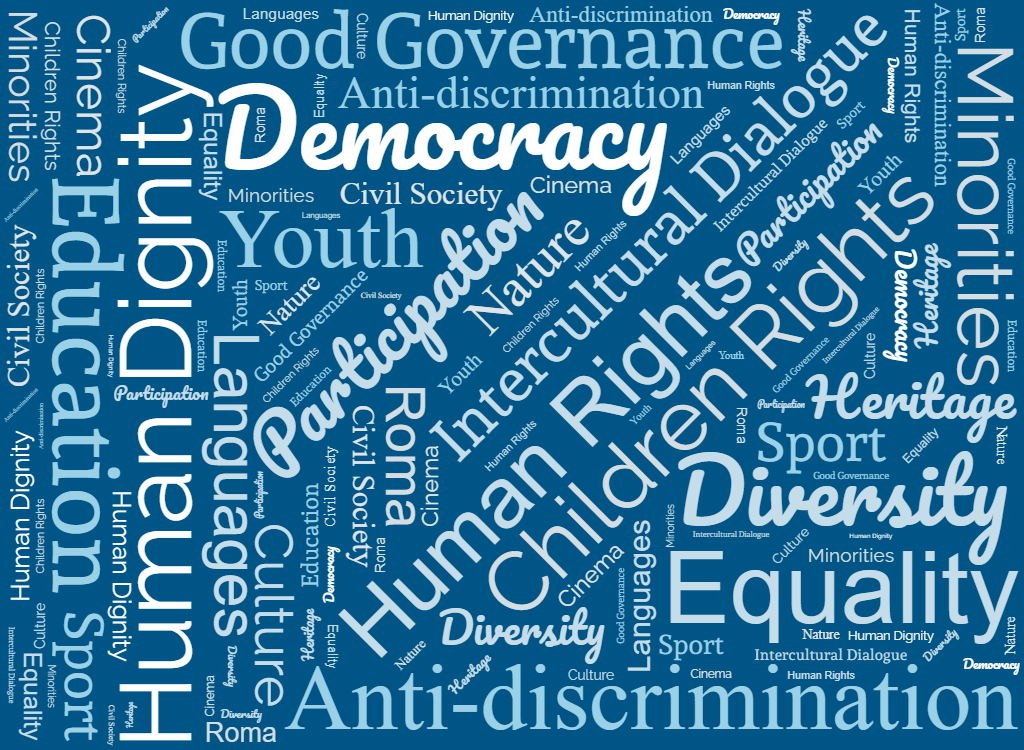Directorate of Equal Rights and Dignity
The Directorate of Equal Rights and Dignity leads the efforts of the Organisation to promote and protect equality for all, including gender equality, fight discrimination in all its forms, building more inclusive societies without racism and intolerance where diversity is respected. It works to promote and uphold children’s rights and operates key Conventions offering protection against some of the most serious attacks on human dignity. In all these areas, the Directorate ensures the functioning of monitoring mechanisms, intergovernmental cooperation and supports member States in implementing the relevant European standards.
The Directorate of Equal Rights and Dignity implements the activities under its responsibility in the Programme and Budget.
Organisation chart of the Directorate of Equal Rights and Dignity
 Anti-discrimination Department
Anti-discrimination Department
- Our European Commission against Racism and Intolerance (ECRI) is the Council of Europe’s independent expert body tasked with monitoring the phenomena of racism and intolerance, as well as related forms of discrimination, in all member states and with making the necessary general or specific recommendations to governments.
- Our treaties – the Framework Convention for the Protection of National Minorities (FCNM) and the European Charter for Regional or Minority Languages (ECRML), monitored by independent experts, protect the rights of persons belonging to national minorities and promote the use of Europe’s regional and minority languages in public life.
- The Steering Committee on Anti-discrimination, Diversity and Inclusion (CDADI) steers the Council of Europe’s intergovernmental work to promote equality for all and build more inclusive societies where diversity is respected and which offer effective protection from discrimination and hate and ensure equal participation in political and public life for all. The CDADI oversees the Committee of Experts on Roma and Traveller Issues (ADI-ROM), the Committee of Experts on Intercultural Inclusion (ADI-INT), and the Committee of Experts on Sexual Orientation, Gender Identity and Expression and Sex Characteristics.
- Extensive programmes and cooperation activities aim to combat discrimination, hate speech and hate crime and to support the empowerment of minorities and the positive management of diversity and respect of human rights. Special attention is paid to the consequences of the deployment of digital technologies, algorithmic and artificial intelligence systems. Such initiatives ensure that the human rights of all Europeans are respected, including those of LGBTI people and marginalised groups.
- Our Roma and Travellers Division assists member States in combatting antigypsyism and segregation in schools and in building the capacities of institutions and professionals to design legislation and policies in line with European standards. This work is carried out with the active involvement of Roma and Traveller civil society.
- Our Unit on Sexual Orientation, Gender Identity and Expression, and Sex Characteristics (SOGIESC) supports member States in protecting the human rights of LGBTI people and fostering equality and inclusion.
- Our Intercultural Inclusion Unit supports local, regional and national authorities in managing and benefiting from cultural and social diversity to build inclusive communities.
 Human Dignity and Gender Equality Department
Human Dignity and Gender Equality Department
- The GEC (Gender Equality Commission) and CD-ENF (Steering Committee for the Rights of the Child) carry out the intergovernmental work in the sectors of gender equality and children’s rights. These committees are guided by pluriannual strategies approved by the Committee of Ministers setting the priorities for the years ahead, namely the Gender Equality Strategy 2024-2029 and the Strategy for the Rights of the Child (2022-2027).
- We oversee the implementation of the following treaties: the “Istanbul Convention” (Preventing and combating violence against women and domestic violence), the “Warsaw Convention” (Action against Trafficking in Human Beings) and the “Lanzarote Convention” (Protection of Children against Sexual Exploitation and Sexual Abuse). Compliance with these legally binding instruments is monitored by different bodies, notably GREVIO (violence against women and domestic violence), GRETA (human trafficking) and the Lanzarote Committee (sexual exploitation and abuse of children).
- In the areas of gender equality, fight against violence against women, trafficking in human beings, rights of the child and sexual exploitation and abuse of children, cooperation work is carried out through tailor-made projects for individual member states or regional projects covering specific geographical zones. Projects are aimed at paving the way to ratification of one of the three treaties or are tailored-made to support governments in implementing the recommendations addressed to them by the monitoring bodies.
- Because gender equality is an essential component of human rights, democracy, and the rule of law, the integration of a gender equality perspective is promoted in all areas of the Council of Europe’s work (gender mainstreaming).



